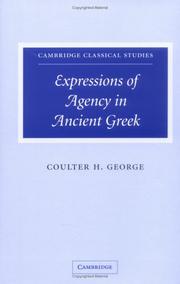| Listing 1 - 9 of 9 |
Sort by
|
Book
ISBN: 9782841338375 2841338371 Year: 2016 Publisher: Caen Presses universitaires de Caen
Abstract | Keywords | Export | Availability | Bookmark
 Loading...
Loading...Choose an application
- Reference Manager
- EndNote
- RefWorks (Direct export to RefWorks)
Lexicology. Semantics --- Grammar --- Pragmatics --- Linguistique comparée. --- Pragmatique. --- Voix passive. --- Pragmatics.
Book
ISBN: 9782343002903 Year: 2013 Publisher: Paris : l'Harmattan,
Abstract | Keywords | Export | Availability | Bookmark
 Loading...
Loading...Choose an application
- Reference Manager
- EndNote
- RefWorks (Direct export to RefWorks)
Anglais (langue) --- Voix passive --- Guides pratiques et mémentos.
Dissertation
Abstract | Keywords | Export | Availability | Bookmark
 Loading...
Loading...Choose an application
- Reference Manager
- EndNote
- RefWorks (Direct export to RefWorks)
Dissertation
Year: 1989 Publisher: Liège : Université de Liège, Faculté de psychologie et des sciences de l'éducation (ULg),
Abstract | Keywords | Export | Availability | Bookmark
 Loading...
Loading...Choose an application
- Reference Manager
- EndNote
- RefWorks (Direct export to RefWorks)
Evaluation de la compréhension de la voix passive chez la personne trisomique 21 en vue d'établir une description plus précise de leur développement langagier, des limites et possibilités d'apprentissage chez ces sujets à l'âge adulte
COMPREHENSION --- VOIX PASSIVE --- ADULTE --- SYNDROME DE DOWN --- LINGUISTIQUE --- LANGAGE -- DEVELOPPEMENT --- COMPREHENSION --- VOIX PASSIVE --- ADULTE --- SYNDROME DE DOWN --- LINGUISTIQUE --- LANGAGE -- DEVELOPPEMENT
Dissertation
Year: 1990 Publisher: Liège : Université de Liège, Faculté de psychologie et des sciences de l'éducation (ULg),
Abstract | Keywords | Export | Availability | Bookmark
 Loading...
Loading...Choose an application
- Reference Manager
- EndNote
- RefWorks (Direct export to RefWorks)
CATEGORISATION SEMANTIQUE --- LANGAGE -- DEVELOPPEMENT --- PSYCHOLINGUISTIQUE --- SEMANTIQUE --- SYNTAXE --- VOIX ACTIVE --- VOIX PASSIVE --- CATEGORISATION SEMANTIQUE --- LANGAGE -- DEVELOPPEMENT --- PSYCHOLINGUISTIQUE --- SEMANTIQUE --- SYNTAXE --- VOIX ACTIVE --- VOIX PASSIVE
Dissertation
Year: 1988 Publisher: Liège : Université de Liège, Faculté de psychologie et des sciences de l'éducation (ULg),
Abstract | Keywords | Export | Availability | Bookmark
 Loading...
Loading...Choose an application
- Reference Manager
- EndNote
- RefWorks (Direct export to RefWorks)
Influence de l'aspect des verbes (perfectifs et imperfectifs) ainsi que du temps de conjugaison (présent et passé composé), de l'actionalité des verbes (mentaux ou d'action) et de la condition de présentation des énoncés (croisement de la voix de la phrase et celle de la question, 4 conditions) sur la compréhension des phrases actives et passives chez les enfants entre cinq et huit ans
COMPREHENSION --- VOIX PASSIVE --- VOIX ACTIVE --- GRAMMAIRE --- LINGUISTIQUE --- APPRENTISSAGE --- REGULATION TEMPORELLE --- ENFANT EN AGE SCOLAIRE --- COMPREHENSION --- VOIX PASSIVE --- VOIX ACTIVE --- GRAMMAIRE --- LINGUISTIQUE --- APPRENTISSAGE --- REGULATION TEMPORELLE --- ENFANT EN AGE SCOLAIRE

ISSN: 18615651 ISBN: 3110184591 9783110184594 3110919435 Year: 2006 Volume: 80 Publisher: Berlin de Gruyter
Abstract | Keywords | Export | Availability | Bookmark
 Loading...
Loading...Choose an application
- Reference Manager
- EndNote
- RefWorks (Direct export to RefWorks)
Zentrales Thema ist das sogennate unpersönliche oder subjektlose Passiv. In der ersten Hälfte der Arbeit wird die Funktion und Entstehung des unpersönlichen Passivs in sprachübergreifender Hinsicht herausgearbeitet. Dies ist zugleich Grundlage für die zweite Hälfte des Werkes: die historische Entwicklung des Passivs, insbesondere des unpersönlichen, im Deutschen.
German language --- Passive voice. --- Passive voice --- ALLEMAND (LANGUE) --- VOIX PASSIVE --- HISTOIRE --- IMPERSONNELS

ISBN: 9780521847896 0521847893 9780511482984 9780511199233 0511199236 0511134541 9780511134548 9780511136733 0511136730 0511482981 1107152879 128042236X 0511182023 051129994X Year: 2005 Volume: *59 Publisher: Cambridge Cambridge university press
Abstract | Keywords | Export | Availability | Bookmark
 Loading...
Loading...Choose an application
- Reference Manager
- EndNote
- RefWorks (Direct export to RefWorks)
Ancient Greek expressed the agents of passive verbs by a variety of means, and this work explores the language's development of prepositions which marked the agents of passive verbs. After an initial look at the pragmatics of agent constructions, it turns to this central question: under what conditions is the agent expressed by a construction other than hupo with the genitive? The book traces the development of these expressions from Homer through classical prose and drama, paying attention to the semantic, syntactic, and metrical conditions that favoured the use of one preposition over another. It concludes with a study of the decline of hupo as an agent marker in the first millennium AD. Although the focus is on developments in Greek, translation of the examples should render it accessible to linguists studying changes in prepositional systems generally.
Agent (Philosophy) --- Greek language --- Passive voice. --- Prepositions. --- Verb. --- Agent (Philosophy). --- Prepositions --- Passive voice --- Verb --- Grec (langue) --- Prépositions --- Voix passive --- Verbes --- Grec (Langue) --- Agent (Philosophie) --- Prépositions --- Passif --- Verbe --- Agency (Philosophy) --- Agents --- Person (Philosophy) --- Act (Philosophy) --- Philosophy --- Classical languages --- Indo-European languages --- Classical philology --- Greek philology --- Prépositions. --- Voix passive. --- Verbes. --- Arts and Humanities --- History --- Greek language - Prepositions --- Greek language - Passive voice --- Greek language - Verb --- Prépositions.
Book
ISBN: 9783110196320 Year: 2009 Publisher: Berlin Mouton de Gruyter
Abstract | Keywords | Export | Availability | Bookmark
 Loading...
Loading...Choose an application
- Reference Manager
- EndNote
- RefWorks (Direct export to RefWorks)
This book analyzes the form and function of the English passive from a verb-based point of view. It takes the position that the various surface forms of the passive (with or without thematic subject, with or without object, with or without by-phrase, with or without auxiliary) have a common source and are determined by the interplay of the syntactic properties of the verb and general syntactic principles. Each structural element of the passive construction is examined separately, and the participle is considered the only defining component of the passive. Special emphasis is put on the existence of an implicit argument (ususally an agent) and its representation in the passive. A review of data from syntax, language acquisition, and psycholinguistics shows that the implicit agent is not just a conceptually understood argument. It is argued that it is represented at the level of argument structure and that this is what sets the passive apart from other patient-subject constructions. A corpus-based case study on the use of the passive in academic writing analyzes the use of the passive in this particular register. One of the findings is that about 20-25% of passives occur in constructions that do not require an auxiliary, a result that challenges corpus studies on the use of the passive that only consider full be-passives. It is also shown that new active-voice constructions have emerged that compete with the passive without having a more visible agent. The emergence of these constructions (such as "This paper argues...") is discussed in the context of changes in the rhetoric of scientific discourse. The book is mainly of interest to linguists and graduate students in the areas of English syntax, semantics, and pragmatics.
English language --- Grammar, Comparative and general --- Passive voice. --- Voice. --- Verb phrase. --- Discourse analysis. --- 802.0-56 --- Engels: syntaxis; semantiek --- 802.0-56 Engels: syntaxis; semantiek --- Grammar --- Voice (Grammar) --- Predicate (Grammar) --- Verb phrase --- Discourse analysis --- Passive voice --- Voice --- Phrasal verb --- Predicate --- Verbals --- Linguistics --- Philology --- Germanic languages --- Anglais (langue) --- Grammaire comparée --- Voix (linguistique) --- Voix passive --- Anglais --- Grammaire comparée
| Listing 1 - 9 of 9 |
Sort by
|

 Search
Search Feedback
Feedback About UniCat
About UniCat  Help
Help News
News